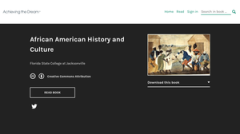Filter by

Writing About Texts
This course, English Composition II, covers elements of modern rhetoric and research composition. Simply put, these learning modules build on the work of English Composition I by exposing students to the fundamental tenets of rhetorical studies while providing them with practice in developing perceptive, credible texts. Greek philosopher Aristotle defined rhetoric as the art of advancing the be…
- Edition
- -
- ISBN/ISSN
- -
- Collation
- -
- Series Title
- -
- Call Number
- 808 FLO w

World Religions
This module will provide students with an introduction to religion as an academic discipline. The module Learning Unit will familiarize students with the difficulties of defining religion as an academic category, explore academic theories for understanding individual religious impetus, and provide a definitional criteria for the term ‘World Religion.’ From there, the student will analyze th…
- Edition
- -
- ISBN/ISSN
- -
- Collation
- -
- Series Title
- -
- Call Number
- 210 FLO w

Philosophy in the Humanities
This textbook is an introduction to philosophy in the humanities. It covers the foundations of philosophy, axiology, epistemology, metaphysics, and philosophy in practice.
- Edition
- -
- ISBN/ISSN
- -
- Collation
- -
- Series Title
- -
- Call Number
- -

Literature for the Humanities
Overview: Literature in the Humanities is an introduction to the study of the characteristics, conventions, and socio-historical contexts of the major literary forms, including the analysis and interpretation of literary elements and devices, and the application of literary theory and criticism. This course is designed to encourage a deep appreciation of literature, hone critical thinking skill…
- Edition
- -
- ISBN/ISSN
- -
- Collation
- -
- Series Title
- -
- Call Number
- 800 FLO l

Life in Its Biological Environment
Overview: This text is an introduction to life as it exists in biological environments.
- Edition
- -
- ISBN/ISSN
- -
- Collation
- -
- Series Title
- -
- Call Number
- 570

African American History and Culture
Overview: This textbook covers a variety of topics related to African American History and culture, from African Origins to the Reconstruction era.
- Edition
- -
- ISBN/ISSN
- -
- Collation
- -
- Series Title
- -
- Call Number
- 900
 Computer Science, Information & General Works
Computer Science, Information & General Works  Philosophy & Psychology
Philosophy & Psychology  Religion
Religion  Social Sciences
Social Sciences  Language
Language  Pure Science
Pure Science  Applied Sciences
Applied Sciences  Art & Recreation
Art & Recreation  Literature
Literature  History & Geography
History & Geography